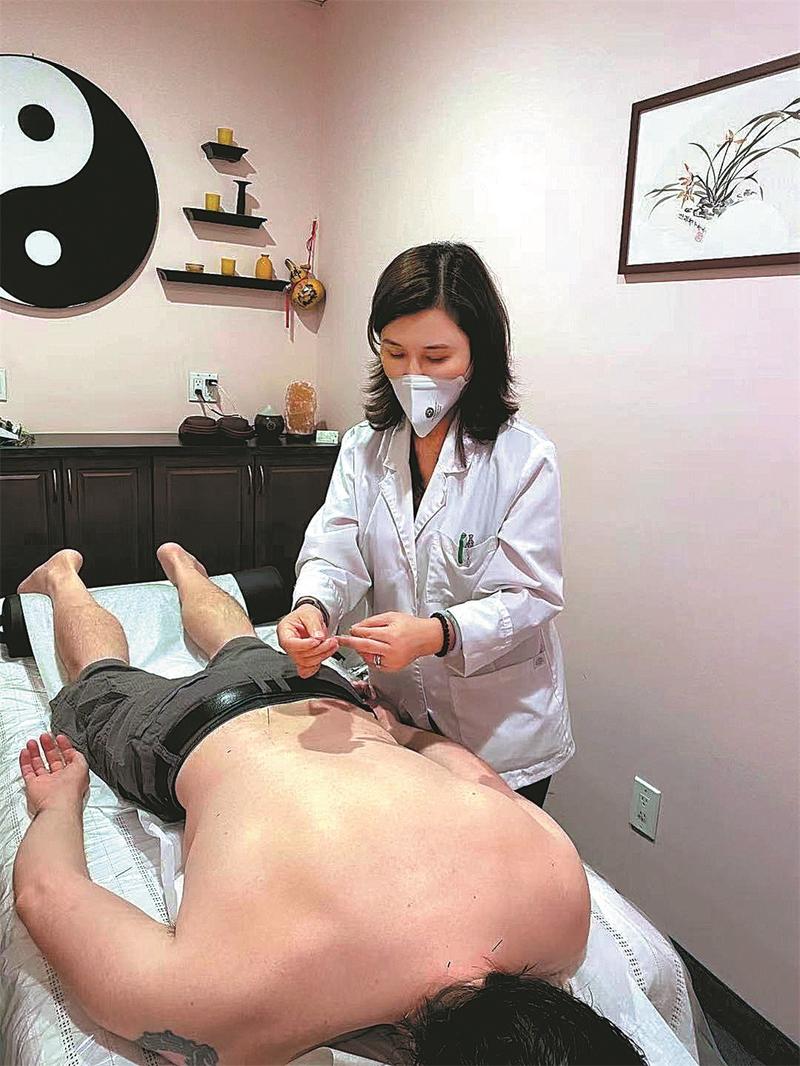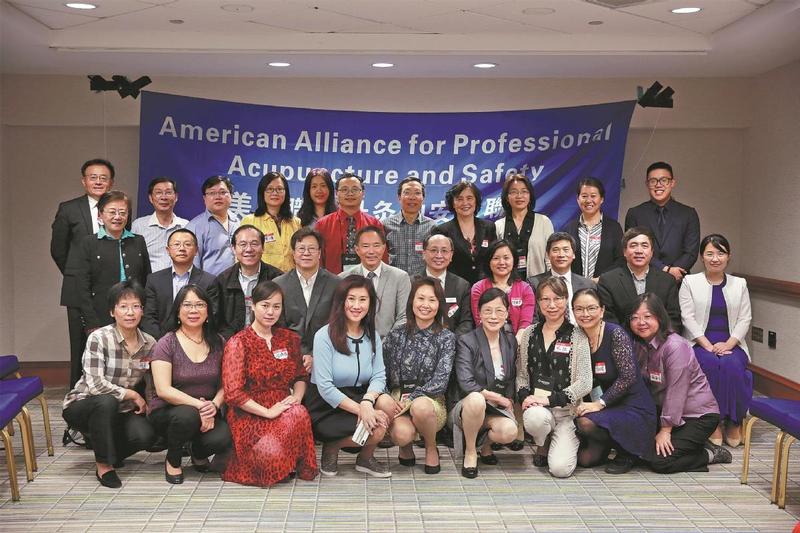TCM puts patients in United States on road to recovery
 Jasmine Hong Lai, a licensed acupuncturist and certified herbalist in New York state, treats a patient last month. (PHOTO PROVIDED TO CHINA DAILY)
Jasmine Hong Lai, a licensed acupuncturist and certified herbalist in New York state, treats a patient last month. (PHOTO PROVIDED TO CHINA DAILY)
When Elvira Figueroa, a 69-year-old hairdresser in New York, found she had COVID-19 in March last year, she thought she was going to die.
"I got every symptom you can imagine," she said. "First, I had a horrible headache for two days, then I started a high fever. Then it went to my lungs. I lost 25 pounds (11.33 kilograms). I was so sick that I don't remember many things."
After Figueroa recovered, she began to experience post-COVID-19 conditions, or long COVID-a term that refers to symptoms that linger for weeks or months beyond infection.
The first five minutes, I was just lying there. After 15 minutes, you just melt into the table. You feel so good, your body feels very loose
Samantha Scher, 27-year-old lawyer treated with acupuncture
"I had no energy and I was very weak. I was constantly exhausted. I took vitamin E and vitamin C, as my cardiologist advised. I had to retire. My nails were getting black, my feet were bleeding. So many things were wrong," she said.
Her cardiologist recommended that she try acupuncture. "It helped me tremendously. I was very, very happy," Figueroa said.
She added that acupuncture helped relieve bodily inflammation and eased pain in her back.
Treatment for post-COVID-19 conditions among many people in the United States now involves lying in a room with warm lighting, listening to relaxing music and watching dozens of needles inserted into one's body.
Practiced in China for thousands of years, acupuncture traditionally involves inserting thin metal needles into specific points in the ears or other parts of the body to relieve pain and restore energy flow.
Studies have shown that COVID-19 causes what is known as a cytokine storm, leading to inflammation that could kill tissue and damage organs. Last year, a study by Harvard University found that acupuncture reduced the impact of cytokine storms in mice.
The research team applied electroacupuncture-a modern version of the traditional manual approach-to a specific point on the legs of mice with a cytokine storm caused by a bacterial toxin.
Researchers found mice treated that way had lower levels of inflammation-inducing cytokines and greater survival than control mice-60 percent of animals treated with acupuncture survived, compared with 20 percent of untreated animals.
The Harvard researchers also found that animals treated with acupuncture immediately before they developed a cytokine storm experienced lower levels of inflammation during subsequent disease and fared better than those that were not treated.
Chinese experts found that acupuncture treatment for COVID-19 suppressed inflammation caused by stress, improved immunity, regulated nervous system functions and helped cancer patients with COVID.
Help for the body
Kai Zhang, a doctor from Tianjin Gong An Hospital, said, "Acupuncture cannot kill the virus directly, but it can regulate the immune system and inhibit inflammation, helping the body fight the virus."
The Wall Street Journal reported that an estimated 10 percent to 30 percent of COVID-19 patients have symptoms weeks and months after first becoming ill, including many young, previously healthy people who initially had mild cases of the disease.
According to the US Centers for Disease Control and Prevention, the most common lasting symptoms are fatigue, shortness of breath, coughing, joint pain and chest pain. Other issues include cognitive problems, difficulty concentrating, depression, muscle pain, headaches, rapid heartbeat and intermittent fever.
New York resident Naoko Baynes said that after having acupuncture, her life returned to normal. She had dysosmia-a disorder that affects the sense of smell-for a year. Infected with the coronavirus in March last year, she was only able to smell burning tires and rotten bananas when she recovered.
"I tried smell training-using four essential oils twice a day for 10 minutes. The oils are meant to cover the four groups of smell. I did this for months and nothing changed," she said.
"I didn't try acupuncture until December. They started by putting needles in my face near my nose and also in my wrists and the crook of the elbow. It was painful, but once the needles were in and twisted, it was fine.
"I felt no change, but then my senses of smell and taste had major shifts over the course of six months, and now I'm 90 percent back to normal. I still have some difficulty with very delicate smells, but that is also changing," she said.
Jasmine Hong Lai, a licensed acupuncturist and certified herbalist in New York state, said acupuncture is "pretty good" for treating post-COVID conditions such as coughs, changes in smell or taste, fatigue and headaches.
 The American Alliance for Professional Acupuncture and Safety holds a conference in Washington in June 2019 to discuss the promotion of acupuncture in the United States. (PHOTO PROVIDED TO CHINA DAILY)
The American Alliance for Professional Acupuncture and Safety holds a conference in Washington in June 2019 to discuss the promotion of acupuncture in the United States. (PHOTO PROVIDED TO CHINA DAILY)
According to the Kaiser Family Foundation, a nonprofit organization based in San Francisco, about four in 10 US adults have reported symptoms of anxiety or depression during the pandemic, a level that has been largely consistent. Such symptoms were reported by one in 10 adults from January to June 2019.
In June, Lai started to treat patients with post-COVID conditions. Most of them were experiencing fatigue and headaches.
When Samantha Scher, a 27-year-old lawyer, recovered from COVID-19, she experienced fainting, severe headaches and dizziness.
"No doctor would see me," said Scher, who felt helpless and became anxious and depressed.
"When I started acupuncture, my body was so bad as a result of COVID and the medicine the hospital gave me when I kept fainting. I felt very tired and nauseous," she said.
After Scher tried acupuncture for a month, she started to feel she was returning to normal.
"I had not had acupuncture before, until COVID. I was afraid of needles, and I had to close my eyes. But as I had very bad anxiety and depression at that time, I didn't really care about the needles. I just needed anything to help," Scher said.
She said her mental issues greatly improved after the acupuncture. Sitting in a massage chair, Scher said her arm felt heavy when she lifted her phone, because she was so relaxed after the treatment.
"The first five minutes, I was just lying there. After 15 minutes, you just melt into the table. You feel so good, your body feels very loose," she said.
According to a study in 2013 on the effects of acupuncture, the body can switch to a resting mode because certain neuropeptides-small proteins-are released in the brain to signal it to go into a state of rest.
Hong Su, a licensed acupuncturist in New York and Connecticut, who is president of the American Traditional Chinese Medicine Society, explained the biggest advantage of using acupuncture to treat post-COVID conditions.
"If the treatment is performed by a licensed acupuncturist who has received professional training, there will be no side effects," Su said.
Lai, the licensed acupuncturist in New York state, said: "You don't become dependent on it (the treatment). Moreover, the needles that we currently use in the US are very tiny and light, so the treatment process is painless. A tinier needle will be more readily accepted by our patients and will reduce the pain on insertion."
This year marks the 50th anniversary of the broad use of acupuncture in the US.
In 1971, The New York Times columnist James Reston opened the door for the treatment in the US. When Reston traveled to China as part of the advance team before US President Richard Nixon's visit the following year, he had an acute attack of appendicitis. While Reston was hospitalized in China, his pain was treated with acupuncture.
He wrote of his experiences with Chinese medicine, and the reports he filed, along with his observations on the effectiveness of acupuncture, helped pave the way for the exploration of alternative medicine in the US.
The Chinese medical treatment has been embraced by patients and doctors in the US as an alternative to the powerful painkillers that are behind the widespread abuse of opioids.
Insurance cover
Last year, Medicare, the largest US federal government insurance program, began covering acupuncture as a treatment for lower back pain due to the nation's opioid crisis. Medicare covers up to 12 sessions in 90 days, with an additional eight sessions for patients with chronic lower back pain who show improvement.
Lai said: "In the US, many people recognize the effect of acupuncture in the treatment of pain, but acupuncture is also very good at treating indigestion, gynecological issues like infertility, and mental issues such as insomnia, anxiety and depression. The good thing is that more people are gaining knowledge of acupuncture."
The cost of acupuncture treatments ranges from US$60 to US$200, depending on the local market and an acupuncturist's experience.
In the US, an acupuncturist needs to complete an accredited educational program and pass a state licensing exam.
Su, the New York and Connecticut acupuncturist, said: "Some acupuncturists graduated from Chinese medicine universities in China, some of them graduated from colleges of traditional Chinese medicine in the US. As long as you meet the assessments designed by the National Certification Commission for Acupuncture and Oriental Medicine and the state licensing exam, you can become an acupuncturist."
According to the American Institution of Alternative Medicine, a bachelor's degree in acupuncture is needed to qualify as a practitioner. The degree takes four years to complete if studying full-time.
Acupuncture Today reported that some 50 schools and colleges in the US provide education in acupuncture and Chinese medicine, and they receive thousands of students every year.



